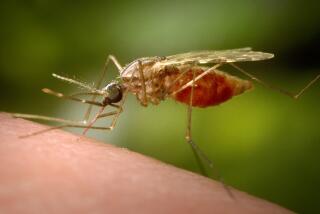Science / Medicine : AIDS Vaccine Promising in Animals
- Share via
An antibody to a tiny segment of the AIDS virus’s outer coating prevented a chimpanzee from developing the disease for at least a year, raising hopes for its use as a vaccine, scientists said last week. The antibody also protected a chimp from infection even when it was administered 10 minutes after exposing the animal to the AIDS virus, researchers reported in Nature.
The treatment, developed by the Merck Co. of New Jersey and the Repligen Corp. of Massachusetts, is a laboratory-made protein called a monoclonal antibody, designed to stimulate the body’s defenses against the human immunodeficiency virus that causes AIDS. It targets a tiny portion of the outer envelope of the virus called gp120.
Because the vaccine provided protection after exposure, it could help protect researchers, health care workers and others inadvertently exposed to the AIDS virus, such as by a needle stick. But many tests will be required before the vaccine can be used in humans, researchers said.





